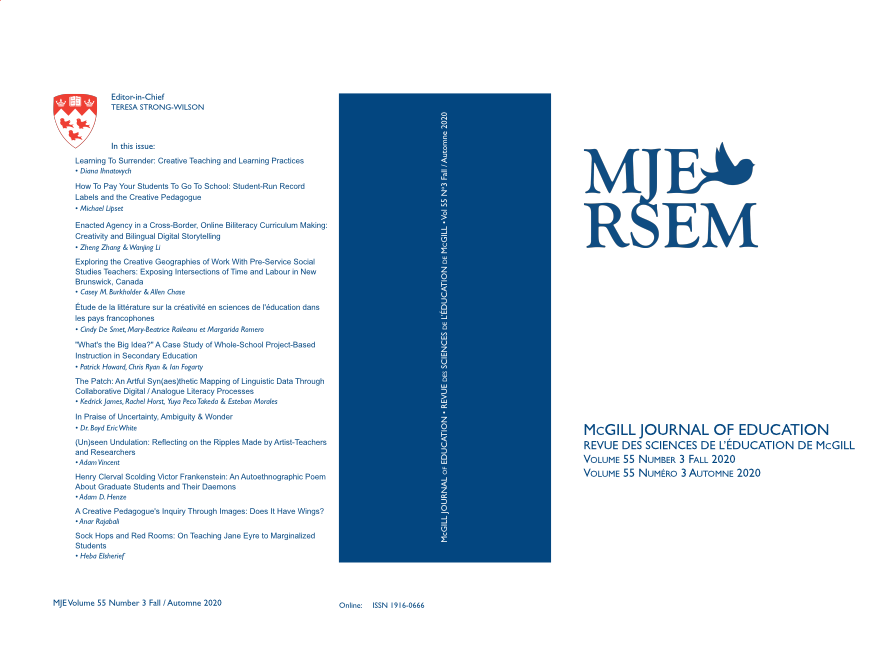Learning to surrender: Creative teaching and learning practices
Keywords:
improvisation, creative expression, piano performance, music pedagogy, teacher educationAbstract
Independence and critical thinking are crucial for survival in our contemporary world. Learners and new teachers in training should be trusted to discover and develop their own voice in teaching and learning and be encouraged to surrender expectation to produce predetermined outcomes by strictly following scripted curriculum because it is detrimental to learners and teachers alike as it does not foster independence and critical thinking. Through engaging in creative teaching and learning practices that encourage imagination, questioning, observation and reflection we can see beyond what is perceived as normal and understandable and seek new ways to interpret reality and experience things of everyday life as well as learn to listen to our students and support them in their own discovery.
References
Altass, P., & Wiebe, S. (2017). Obsolete ideologies for the knowledge based creative economy: Essential next steps for innovative classroom practices. Teaching and Learning, 11(1), 32-46. https://doi.org/10.26522/tl.v11i1.437
Ashton, W., & Denton, D. (2006). Introduction: Spirituality, ethnography and teaching. In W. Ashton & D. Denton (Eds.), Spirituality, ethnography, and teaching: Stories from within (pp. 1-14). Peter Lang Inc.
Bloom, L.A., & Dole, S. (2018). Creativity in education: A global concern. Global Education Review 5(1), 1-4.
Bloom, M., & Gullotta, T. P. (2001). Creativity and primary prevention: Terms of engagement. In M. Bloom & T.P. Gullotta (Eds.), Promoting creativity across the life span. (pp. 1–16). CWLA Press.
Denzin, N. K. (2013). Interpretive autoethnography. In S.L. Holman Jones, T.E. Adams, & C. Ellis (Eds.), Handbook of autoethnography (pp. 123-142). Left Coast Press, Inc.
DeZutter, S. (2011). Professional improvisation and teacher education: Opening the conversation. In R. Sawyer (Ed.), Structure and improvisation in creative teaching (pp. 27-50). Cambridge University Press.
Eisner, E. W. (2002). The arts and the creation of mind. Yale University Press.
Ellis, C. (2009). Revision: Autoethnographic reflections on life and work. Left Coast Press, Inc.
Freire, P. (2008). Pedagogy of the oppressed. Continuum.
Gouzouasis, P., & Ryu, J. Y. (2015). A pedagogical tale from the piano studio: Autoethnography in early childhood music education research. Music Education Research, 17(4), 397-420. https://doi.org/10.1080/14613808.2014.972924
Green, L. (2008). Music, informal learning and the school: A new classroom pedagogy. Ashgate Publishing.
Greene, M. (1995). Releasing the imagination: Essays on education, the arts, and social change. Jossey-Bass Publishers.
Howard, P., Becker, C., Wiebe, S., Carter, M., Gouzouasis, P., McClarnon, M., Richardson, P., Ricketts, K., & Schuman, L. (2018). Creativity and pedagogical innovation: Exploring teachers' experiences of risk-taking. Journal of Curriculum Studies, 50(6), 850-864. https://doi.org/10.1080/00220272.2018.1479451
Jones, S. L., Adams, T.E., & Ellis, C. (2013). Introduction: Coming to know autoethnography as more than a method. In S. L. Jones, T. E. Adams, & C. Ellis (Eds.), Handbook of autoethnography (pp. 17-47). Left Coast Press, Inc.
Meisner, S., & Longwell, D. (1987). Sanford Meisner on acting (1st ed.). Vintage Books.
Meyer, K. (2006). Living inquiry: A gateless gate and a beach. In W. Ashton & D. Denton (Eds.), Spirituality, ethnography and teaching: Stories from within (pp. 156–166). Peter Lang.
Meyer, K. (2010). Living inquiry: Me, myself and other. Journal of Curriculum Theorizing, 26(1), 85-96.
Nachmanovitch, S. (1990). Free play: Improvisation in life and art. Jeremy P. Tarcher.
Nussbaum, M. C. (2011). Creating capabilities: The human development approach. Harvard University Press.
Paynter, J., & Aston, P. (1970). Sound and silence: Classroom projects in creative music. Cambridge.
Pinar, W. F. (2004). A lingering note: An introduction to the collected works of Ted Aoki. In W. F. Pinar & R. L. Irwin (Eds.), Curriculum in a new key: The collected works of Ted Aoki (pp. 1-89). Lawrence Erlbaum.
Wiebe, S., Gouzouasis, P., Howard, P., McLarnon, M., Ricketts, K., & Shuman, L. (2018). Teaching creativity, creatively teaching: Exploring the arts and design thinking in education. Special capsule issue, Canadian Journal of Education, 41(1), i-vii.
Zhao, Y. (2012). World class learners: Educating creative and entrepreneurial students. Corwin Press.
Published
How to Cite
Issue
Section
License
Copyright (c) 2021 McGill Journal of Education / Revue des sciences de l'éducation de McGill

This work is licensed under a Creative Commons Attribution-NonCommercial-NoDerivatives 4.0 International License.



